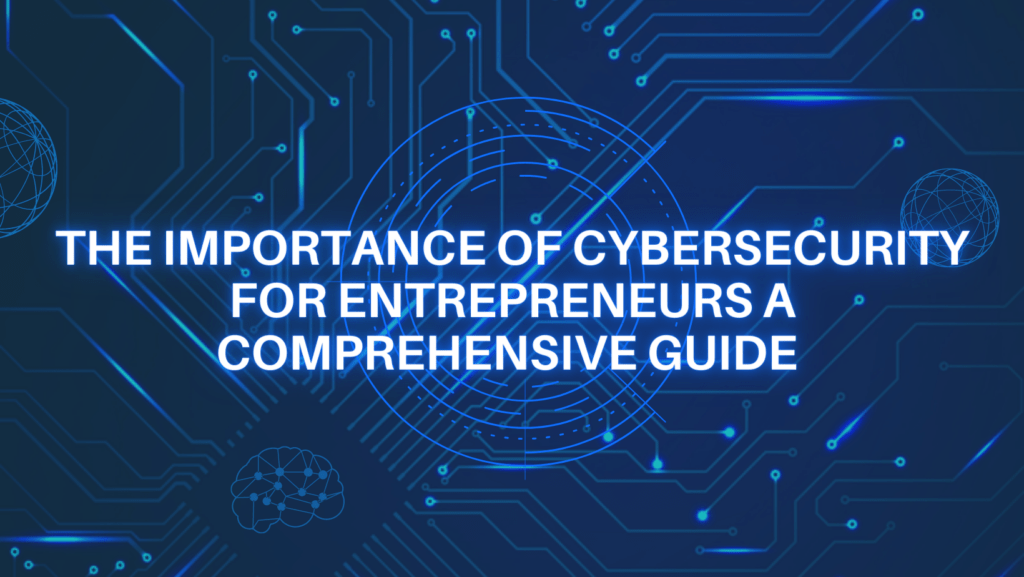Introduction
In today’s digital age, cybersecurity is an essential aspect for businesses of all sizes, especially for entrepreneurs who run small businesses. Cybersecurity is the practice of protecting internet-connected systems, including hardware, software, and data, from cyber-attacks, theft, damage, or unauthorized access. Cybersecurity threats can have significant consequences for businesses, ranging from financial losses to damage to the company’s reputation. In this blog, we will discuss the importance of cybersecurity for entrepreneurs and how they can protect their business from cybersecurity threats.
Why Cybersecurity is Important for Entrepreneurs
Entrepreneurs face unique challenges when it comes to cybersecurity. Small businesses often have limited resources and may not have dedicated IT departments to manage cybersecurity. As a result, they are more vulnerable to cyber-attacks, which can lead to significant financial losses and damage to the company’s reputation. Cybersecurity is essential for entrepreneurs for the following reasons:
1. Protection of Sensitive Data:
Entrepreneurs often store sensitive information, such as customer data, financial information, and intellectual property, which can be targeted by cybercriminals.
2. Legal Compliance:
Many industries have regulatory requirements for data protection, and non-compliance can result in significant fines.
3. Business Continuity:
Cybersecurity threats can disrupt business operations, resulting in lost revenue and damage to the company’s reputation.
Common Cybersecurity Threats for Entrepreneurs
Entrepreneurs face a variety of cybersecurity threats, including:
1. Phishing attacks:
Phishing attacks are one of the most common types of cyber attacks that entrepreneurs face. These attacks involve tricking the victim into clicking on a link or opening an attachment that appears to be legitimate, but is actually designed to steal sensitive information such as passwords, credit card numbers, or other personal data.
2. Ransomware attacks:
Ransomware attacks involve infecting your computer with malware that encrypts your data and demands payment in exchange for a decryption key. This can be particularly devastating for entrepreneurs who may have important data and information stored on their computers.
3. Malware attacks:
Malware is any type of malicious software that is designed to damage, disrupt, or gain unauthorized access to a computer system. Malware can be spread through email attachments, social media links, or infected websites.
4. DDoS attacks:
A DDoS (Distributed Denial of Service) attack involves flooding a website or server with traffic, causing it to crash or become unavailable. This can be used as a distraction or as a way to extort money from businesses.
5. Insider threats:
Insider threats involve employees or contractors who have access to sensitive information or systems and use that access for malicious purposes. This can include stealing data, sabotaging systems, or sharing sensitive information with outside parties.
How to Protect Your Business from Cybersecurity Threats
Entrepreneurs can take several steps to protect their business from cybersecurity threats, including:
Employee Training:
Providing regular cybersecurity training to employees can help them recognize and avoid common cyber threats.
Cybersecurity Tools and Software:
Investing in cybersecurity tools and software, such as firewalls, antivirus software, and intrusion detection systems, can help protect against cyber threats.
Incident Response Plan:
Having an incident response plan in place can help entrepreneurs respond quickly and effectively to cyber attacks.
Read Also : 4 Reasons Businesses Should Get Cybersecurity Consulting Services
Cybersecurity Best Practices for Entrepreneurs
In addition to the above steps, entrepreneurs can also follow best practices to improve their cybersecurity, including:
1. Implementing Strong Password Policies:
Encouraging employees to use strong passwords and implementing two-factor authentication can prevent password attacks.
2. Keeping Software Up to Date:
Keeping software and operating systems up to date can prevent vulnerabilities that can be exploited by cybercriminals.
3. Limiting Access to Sensitive Data:
Limiting access to sensitive data to only those who need it can reduce the risk of insider threats.
4. Conducting Regular Cybersecurity Audits:
Regularly auditing systems and processes can help identify vulnerabilities and prevent cyber attacks.
Conclusion
Cybersecurity is critical for entrepreneurs in today’s digital age. With the increasing number of cyber threats, entrepreneurs must take proactive measures to protect their business from cyber attacks. By implementing cybersecurity best practices and investing in cybersecurity tools and software, entrepreneurs can mitigate the risks of cyber attacks and ensure the security of their data and systems.
In conclusion, cybersecurity should be a top priority for entrepreneurs, regardless of the size of their business. By following best practices and staying informed of the latest cybersecurity threats, entrepreneurs can protect their business from potential financial losses, legal liabilities, and damage to their reputation. It is essential to recognize the importance of cybersecurity and take proactive steps to ensure the security of your business. By partnering with cybersecurity experts in New Jersey, entrepreneurs can gain access to specialized knowledge and expertise to help protect their business from cyber threats.











